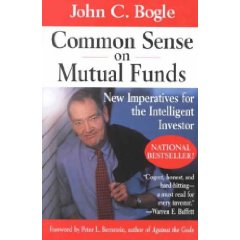Investment Strategy Bogle begins this section by detailing the importance of long term investing, which is critical for retirement investing. If this economic downturn doesn’t make you look at a long-term investment horizon, I don’t know what will. Bogle stresses investing early with a long-term horizon to decrease the volatility of your returns. Another key aspect of investment strategy is asset allocation. Bogle recommends selecting an asset allocation based on each individuals optimal risk and reward. The final key point of this section focuses on the engineers slogan of K.I.S.S. (keep it simple stupid). Bogle argues that the simple way to invest is by picking index funds instead of trying to pick the best active manager, selecting low cost funds, holding investments over time and limiting the number of funds you buy. Investment Choices This section is where Bogle begins to really hammer his main theme for the whole book, INVEST IN INDEX FUNDS. Bogle throws some fancy stats around that state index funds have achieved a 12.5% return compared to a 10.8% return for equity funds over a 30 year period. He attributes the disparity to fund costs. He then continues to argue that index funds are more tax-efficient and reduce risk. Bogle discusses the relationship between cost and return for bonds. His argument is the same as with equities. As the cost drops, returns rise. Once again Bogle calls for minimizing costs in the bond arena. I don’t know how I feel about Bogle’s position on global investing. He basically says that a large enough percent of net income from companies in the S&P 500 is derived outside of the US that additional foreign investing in unnecessary. I will be doing some reading into asset allocation in the near future, after which I will define my position on foreign investing. Investment Performance The investment performance section starts out with a very impressive mathematical defense of all funds eventually reverting to the mean. Bogle basically states that funds are allowed to significantly outperform the market for a few years, however, those years will be followed by years of under performing. He provides stats that prove his case for large cap and small cap stocks, US and international stocks, growth funds and value funds, and high grade stocks and low priced stocks. Bogle uses the reversion to the mean argument to support index fund investing by saying that high flying stocks will always revert to the mean, so you might as well invest in funds that have lower costs. When dealing with non-indexed funds, Bogle states that it is crucial to evaluate the fund asset size. Investors are attracted to high return funds. The problem arises when these fund managers are not able to invest in the same manner that provided the high returns when the asset size greatly increases. Index funds do not share the same problem. Bogle argues that taxes severely reduce your investment performance. Portfolio turnover is trending upward, which turns more of your gains into short-term capital gains, which are taxed at a higher rate. Bogle suggests index funds as a good solution to the portfolio turnover problem, however, he says tax-managed funds are the best solution. These funds emphasize growth stocks that provide low dividend yields, offset gains by harvesting losses, replace funds sold for harvesting after 30 days, emphasize long-term investing by charging early redemption fees, and minimize costs similar to index funds. The final chapter about investment performance focuses on time. This one is pretty self-explanatory as the first thing you learn about investing is about the magic of compounding. Bogle uses this section to hammer home the importance of reducing costs by displaying how much your additional costs end up reducing your nest egg. Fund Management Bogle uses this entire section to vent about how mutual funds do not focus on providing returns for shareholders the same way that individual companies focus on providing returns for shareholders. I can almost see him writing this section with a case of Coors Light, “venting”. He explains how expense ratios have increased without a corresponding increase in value to the shareholder. Similarly, a large amount of the increasing fees are going towards marketing to bring in more assets that generate more fees for the management team, which is detrimental to the shareholder due to the increased asset size. Bogle raises an interesting argument regarding the impact of technology on fund management. Technology has made transactions easier, increased the information availability and brought about new financial instruments. Bogle argues that investors are not using the increased availability of information to make smarter decisions, just more decisions. Technology has aided in the increase in portfolio turnover and helped people chase returns only to diminish them. Two chapters are spent detailing the structure and management of funds and how it is not benefiting the shareholder, but I found it extremely boring, so I’m going to just move on. Spirit The final section details his adventures with starting Vanguard, which is actually pretty interesting, but it doesn’t really have a place in my personal finance blog, and I’m getting really tired at the moment. Conclusion Overall, I enjoyed this book. Bogle relies heavily on numbers and stats to make his arguments. If numbers and stats are not your cup of tea, then this book is not for you. I really enjoyed reading his arguments for index investing. After reading this book, I am more convinced that index investing is the correct route for my retirement investing. If you’re looking to be beat over the head with index investing then you should read this book. Also, the last section on the rise of Vanguard was pretty interesting. I do feel as though I learned a good deal more in the previous books that I have read. |
Book Review: Common Sense On Mutual Funds
Posted in Reviews.
– November 17, 2008











0 Responses